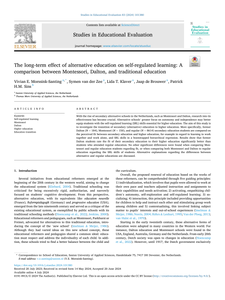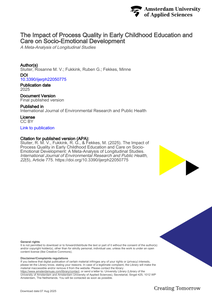Morssink-Santing, V. E., van der Zee, S., Klaver, L. T., de Brouwer, J., andamp; Sins, P. H. (2024). The long-term effect of alternative education on self-regulated learning: A comparison between Montessori, Dalton, and traditional education. Studies in Educational Evaluation, 83, 101380. https://doi.org/10.1016/j.stueduc.2024.101380
MULTIFILE

Innovation is crucial for higher education to ensure high-quality curricula that address the changing needs of students, labor markets, and society as a whole. Substantial amounts of resources and enthusiasm are devoted to innovations, but often they do not yield the desired changes. This may be due to unworkable goals, too much complexity, and a lack of resources to institutionalize the innovation. In many cases, innovations end up being less sustainable than expected or hoped for. In the long term, the disappointing revenues of innovations hamper the ability of higher education to remain future proof. Against the background of this need to increase the success of educational innovations, our colleague Klaartje van Genugten has explored the literature on innovations to reveal mechanisms that contribute to the sustainability of innovations. Her findings are synthesized in this report. They are particularly meaningful for directors of education programs, curriculum committees, educational consultants, and policy makers, who are generally in charge of defining the scope and set up of innovations. Her report offers a comprehensive view and provides food for thought on how we can strive for future-proof and sustainable innovations. I therefore recommend reading this report.
DOCUMENT

Currently, various higher education (HE) institutes develop flexible curricula for various reasons, including promoting accessibility of HE, the societal need for more self-regulated professionals who engage in life-long learning, and the desire to increase motivation of students. Increasing flexibility in curricula allows students to choose for example what they learn, when they learn, how they learn, where they learn, and/or with whom. However, HE institutes raise the question of what preferences and needs different stakeholders have with regard to flexibility, so that suitable choices can be made in the design of policies, curricula, and student support programs. In this workshop, we focus on student preferences and share recent insights from research on HE students' preferences regarding flexible education. Moreover, we use participants’ expertise to identify new (research) questions to further explore what students’ needs imply for several domains, namely curriculum-design, student support that is provided by educators/staff, policy, management, and the professional field. Firstly, a conceptual framework on flexible education and student’s preferences will be presented. Secondly, participants reflect in groups on student personas. Then, discussion groups have a Delphi-based discussion to collect new ideas for research. Finally, participants share the outcomes on a ‘willing wall’ and a ‘wailing wall’.
MULTIFILE

This study was conducted in the context of primary teacher education. The primary teacher education program at HU University of Applied Sciences is at the start of a curriculum redesign in which assessment for learning and feedback will be emphasized. We know assessment and feedback can increase student learning and performance. In the last couple of years students as feedback receivers are placed in the centre of the feedback process. When students actively take up feedback their engagement in feedback will increase. However, some feedback situations work well for them and some don’t. In this study we try to grasp both situations and figure out which factors of the feedback situation did work or did not. We focused on two processes during the interviews and the coding. The first process was about the feedback situation, which characteristics of the feedback context, the receiver and the sender were at hand, and second what did students do with the feedback, did they try to understand and use the feedback, react to or ask for new feedback. The aim of this study is to provide feedback situations that work for our students and use them as elements in the redesign of the curriculum.
DOCUMENT

Process Mining can roughly be defined as a data-driven approach to process management. The basic idea of process mining is to automatically distill and to visualize business processes using event logs from company IT-systems (e.g. ERP, WMS, CRM etc.) to identify specific areas for improvement at an operational level. An event log can be described as a database entry that signifies a specific action in a software application at a specific time. Simple examples of these actions are customer order entries, scanning an item in a warehouse, and registration of a patient for a hospital check-up.Process mining has gained popularity in the logistics domain in recent years because of three main reasons. Firstly, the logistics IT-systems' large and exponentially growing amounts of event data are being stored and provide detailed information on the history of logistics processes. Secondly, to outperform competitors, most organizations are searching for (new) ways to improve their logistics processes such as reducing costs and lead time. Thirdly, since the 1970s, the power of computers has grown at an astonishing rate. As such, the use of advance algorithms for business purposes, which requires a certain amount of computational power, have become more accessible.Before diving into Process Mining, this course will first discuss some basic concepts, theories, and methods regarding the visualization and improvement of business processes.
MULTIFILE
Abstract Business Process Management (BPM) is an important discipline for organizations to manage their business processes. Research shows that higher BPM-maturity leads to better process performance. However, contextual factors such as culture seem to influence this relationship. The purpose of this paper is to investigate the role of national culture on the relationship between BPM-maturity and process performance. A multiple linear regression analysis is performed based on data from six different countries within Europe. Although the results show a significant relationship between BPM-maturity and process performance, no significant moderation effect of national culture has been found. The cultural dimension long term orientation shows a weak negative correlation with both BPM-maturity and process performance. Through a post-hoc moderation analysis on each dimension of BPM-maturity, we further find that long term orientation negatively moderates the relationship between process improvement and process performance. Three other moderation effects are also discovered. The results of this study contribute to insights into the role of culture in the field of BPM.
MULTIFILE

We investigated the relationship between process quality in early childhood education and care (ECEC) and children’s socio-emotional development in a meta-analysis of longitudinal studies. Our multi-level meta-analysis of 31 publications reporting on 16 longitudinal studies (N = 17,913 children, age: 2.5–18 yrs) demonstrates that the process quality of ECEC is a small but significant predictor of children’s socio-emotional development over time (ES = 0.103, SE = 0.026, p < 0.001, 95% CI: 0.052–0.155). This longitudinal association extends to the age of 18 years in our sample. Process quality of ECEC is, thus, a significant and stable predictor of children’s socio-emotional development and well-being from toddlerhood to adolescence. The longitudinal relationship was moderated by the type of care (center-based vs. home-based) and the informant (parent, professional caregiver, external assessor, or self-report of the child). Implications for future ECEC research are discussed.
MULTIFILE

Longitudinal Business Process Management (BPM) studies are rare. BPM maturity and process performance can be used to quantify an organization's BPM evolution. This research aims to examine the growth of BPM maturity over time and its impact on process performance inside an organization in continuous transformation. Over a seven-year period, BPM maturity and process performance were measured annually at a Dutch university. During this time, the organization has undergone an organizational restructuring with a focus on process management and has temporarily switched completely to digital education propelled by the Covid-19 crisis. Based on a repeated cross-sectional study (N = 921), the results present key BPM maturity features that are critical during disruptive organizational transformations. Furthermore, we found that BPM maturity is positively related to process performance throughout organizational changes during the period of our research
LINK
Every healthcare professional (HCP) in the Netherlands is expected to provide palliative care based on their initial education. This requires national consensus and clarity on the quality and goals of palliative care education and accessible education opportunities nationwide. These requirements were not met in the Netherlands, posing a major obstacle to improving the organization and delivery of palliative care. Therefore, a program, Optimizing Education and Training in Palliative Care (O2PZ), was established to improve palliative care education on a national level.
MULTIFILE

In this article, we elaborate on the role of dialogical learning in identity formation in the context of environmental education. First, we distinguish this kind of learning from conditioning and reproductive learning. We also show that identity learning is not self-evident and we point out the role of emotions. Using Dialogical Self Theory, we then suggest that individuals do not have an “identity hierarchy” but a dialogical self that attaches meaning to experiences in both conscious and unconscious ways. We describe the learning process that enables the dialogical self to develop itself, and we elaborate on the characteristics of a good dialogue. We conclude with some remarks expanding room for a dialogue that would foster identity learning. https://doi.org/10.3390/resources5010011 https://www.linkedin.com/in/helenkopnina/
MULTIFILE
